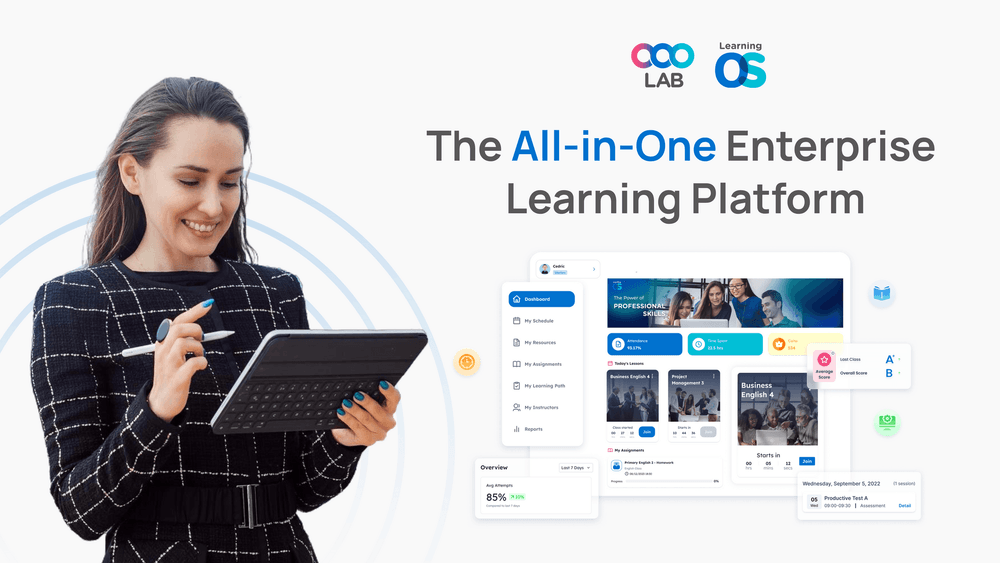

The learning management system (LMS) landscape is evolving rapidly, driven by technological advancements and changing workforce needs. For large organizations, an enterprise LMS is a critical tool for delivering scalable, effective training that aligns with business goals. As we approach 2026, selecting the right enterprise LMS requires understanding key features that enhance learning, streamline operations, and drive measurable outcomes. From AI-driven personalization to robust analytics, the right features can transform training programs and empower teams.
This blog explores essential enterprise LMS features to prioritize in 2026, supported by data-driven insights and practical guidance. We will highlight how these features address modern training challenges, ensuring organizations stay competitive.

An enterprise LMS serves as a centralized platform for delivering training, tracking progress, and optimizing performance across global teams. Unlike smaller-scale LMS platforms, enterprise solutions are designed for scalability, security, and integration with complex organizational systems. They support diverse use cases, from onboarding to compliance training and upskilling, making them indispensable for large organizations.
A 2024 Forrester report predicts that by 2026, 73% of enterprises will adopt AI-enhanced LMS platforms to improve training outcomes. Selecting an enterprise LMS with cutting-edge features ensures organizations can meet evolving demands, from hybrid workforces to regulatory compliance.
>>> Read more: What is an Enterprise LMS
>>> Read more: Customization Options for Enterprise LMS
To meet the demands of modern training, organizations should focus on the following enterprise LMS features, each designed to enhance learning and operational efficiency.
Personalized learning paths are critical for engaging diverse workforces. AI-driven enterprise LMS platforms analyze employee data—such as performance metrics or job roles—to recommend tailored content. For example, a sales rep might receive modules on objection handling, while a manager focuses on leadership training.
A 2025 McKinsey study found that personalized training increases engagement by 67% and skill retention by 56%. AI personalization ensures training is relevant, boosting adoption and impact enterprise LMS.
With hybrid and remote work becoming standard, mobile access is non-negotiable. An enterprise LMS should offer a responsive, mobile-first interface, enabling employees to access training on smartphones or tablets. Features like offline access and push notifications ensure seamless learning on the go.
Mobile learning increases accessibility, allowing reps to complete training during downtime. This flexibility is critical for global teams across time zones enterprise LMS.
Data-driven insights are essential for optimizing training programs. An enterprise LMS should provide robust analytics, tracking metrics like completion rates, quiz scores, and performance improvements. Customizable dashboards enable managers to monitor progress and identify skill gaps.
A 2023 Deloitte report notes that data-driven training improves program effectiveness by 25%. Analytics help organizations measure ROI and refine content, ensuring alignment with business objectives enterprise LMS.
Gamification—using points, badges, and leaderboards—makes training interactive and motivating. An enterprise LMS should support gamified elements, such as virtual challenges or team competitions, to boost participation. For instance, reps might earn points for completing compliance modules.
Gamified training increases completion rates by 50 percent, fostering a culture of engagement. This feature appeals to competitive teams, enhancing learning outcomes enterprise LMS.
An enterprise LMS must integrate with existing systems like CRMs (e.g., Salesforce), HR platforms, or collaboration tools (e.g., Microsoft Teams). Integration delivers training within workflows, such as prompting a module before a sales call. This ensures relevance and minimizes disruption.
Integration streamlines operations, enabling just-in-time learning that aligns with daily tasks. It also enhances data sharing across platforms, improving efficiency enterprise LMS.
Regulatory compliance is critical for industries like healthcare or finance. An enterprise LMS should automate certification tracking, send reminders for renewals, and generate compliance reports. For example, it might track HIPAA training completion for healthcare reps.
Automated compliance management reduces administrative burden and ensures adherence to regulations, minimizing risks. This feature is essential for global organizations enterprise LMS.
Busy employees need concise, focused training. Microlearning—short, 5- to 10-minute modules—delivers content in digestible formats, such as videos or quizzes. An enterprise LMS should support microlearning, enabling reps to learn during breaks or commutes.
Microlearning improves retention by 20%, fitting seamlessly into demanding schedules. It ensures continuous learning without overwhelming employees' enterprise LMS.
Simulations allow employees to practice skills in realistic scenarios. An enterprise LMS with AI-powered role-playing can simulate sales pitches or customer interactions, providing instant feedback on performance. This is particularly valuable for sales teams honing negotiation skills.
Collaboration fosters knowledge sharing and team cohesion. An enterprise LMS should include forums, peer reviews, or group challenges where employees exchange insights. For example, reps might share tips on handling objections in a discussion board. Social learning builds a sense of community, especially for remote teams, and encourages innovation through collective expertise enterprise LMS.
>>> Read more: Common challenges when implementing an Enterprise LMS
>>> Read more: Steps to implement an Enterprise LMS
>>> Read more: Enterprise LMS - revolutionizing corporate training and development
Book Free Demo with us. Bring your Training and Learning to a new height with LearningOS.

Selecting an enterprise LMS with the right features is critical for modern training success. AI personalization, mobile access, and robust analytics empower organizations to deliver engaging, effective learning at scale. By focusing on these features, businesses can address compliance, upskill teams, and drive performance in 2026.
Invest in an enterprise LMS today to transform your training programs. With the right platform, your organization will be equipped to meet future challenges and achieve lasting success.
At OOOLAB (pronounced 'uːlæb'), our mission is to make complex learning operations simple. We aim to positively impact the lives of over 1,000,000 learners and educators by the end of 2026.
OOOLAB's LearningOS provides educational institutions and corporate enterprises with an all-in-one solution to create and deliver engaging learning experiences.
We meet organizations' needs or support your growth. We provide undivided attention. We provide:
1. Dedicated success manager: We offer direct communication with a real human who'll discuss your enterprises unique learning operations and goals.
2. Personalized setup: Our team will help you transition to LearningOS on your schedule, one step at a time.
3. Around the clock support: Get help from us any time, and in any time zone.
We have recently launched a new AI training tool, Skill Quotient OS, designed to elevate hybrid training to new heights. It offers role-play exercises with scenarios and assessments.This tool can apply in sales training, corporate development and customer support training in any industry.
Reach out to us at: LinkedIn, Facebook, Instagram, Tiktok, X
1. What are the main benefits of LearningOS
Our platform is easy to use and automates all aspects of your learning operations. It efficiently manages complex tasks, allowing you to concentrate on delivering exceptional learning experiences.
2. What main features does LearningOS offer?
Our all-in-one software solution combines a Content Management System, a Learning Management System, content authoring tools, and a mobile friendly Learner Portal.
3. Can your platform be used for corporate enterprises?
Absolutely! LearningOS is an Enterprise LMS is a great fit for corporate learning. In fact, we have clients with up to 700,000 employees using LearningOS! Upskill your workforce by creating and assigning interactive eLearning content while effortlessly tracking employee progress.
4. Who currently uses your platform?
Our platform is currently used by over 120,000+ learners, parents, and employees across 21 countries worldwide!
5. What types of content options are available on your platform?
We offer ready-to-go curriculums for various educational purposes or our expert design team can build a custom course for you. We can also upload your existing learning materials and enhance them digitally.
6. What is unique about LearningOS?
Our platform, designed by educators for educators, provides you with all the tools you need to scale. Build and promote your own hybrid and blended learning courses and save money on licensing fees by owning your own proprietary content.
7. How can I get started?
Schedule a meeting with our experts and we’ll talk about how our platform can address your unique challenges and help to grow your business.